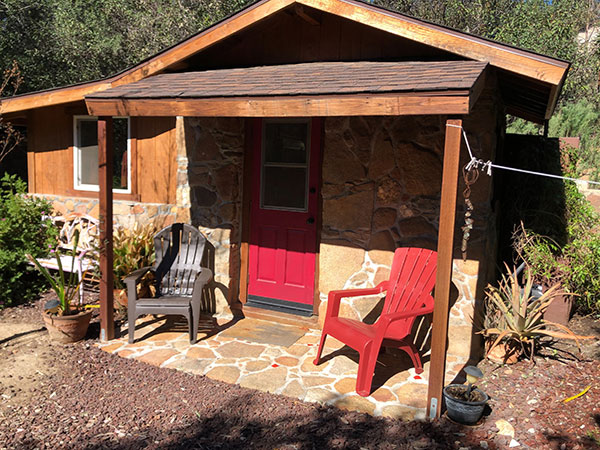I’ve been thinking a lot lately about the concept of less being more and I believe it’s true for so many things. It is certainly the case considering all the stuff we have around the house once we realize that our children are not interested in any of it. Some of us were raised by Depression-era parents who saved practically everything because you might need it someday. However, this someday never really comes and if, on occasion, it does, then we can’t find what we need anyway as it lies buried in all the other stuff we saved.
Why is it that the fire smoldering beneath our urge to purge burns hotter as we lose the ability to deal with it all effectively? I can feel it becoming more difficult as I age—both physically and mentally. There are always things which seem easier to accomplish.

One of these tasks is to walk the dog, or better yet, turn her loose for yahoo time. Now that the creek is raging, Zelda zips around, through and over the water. Her enthusiasm is contagious, at least in spirit, and I can’t help but laugh at both her precision moves and her misfires. It must be so much fun to be a two-year-old Australian shepherd!
Yard work calls, house work demands, and maintenance needs can make themselves known suddenly and inconveniently. So why are we so resistant to living more communally with others when so many of these tasks could be shared? Mine, mine, mine comes at a high cost—individually, collectively, and environmentally. Obviously, communes didn’t work out very well. One reason is that a few individuals carried the work load for the entire group.
However, something akin to an intentional community has enormous potential. The members communicate more effectively because they are all committed to making it work. They each have a vested interest. Chores, maintenance, and the sharing of tools and resources can be part of the lifestyle of the village because they each have a stake in its success. A certain pride of ownership, you might say.
At least with smaller houses you can’t physically accumulate as much stuff—hence my fascination with tiny houses. We attended the Tiny House Fest at the Del Mar Fairgrounds, meandering through upscale van conversions and tiny houses on wheels (or not)—all with the latest technology. And then there were the down to basics, hand-built little huts and old retrofitted buses. Much more up my alley. A few of these folks chatted enthusiastically about their process in creating their small abodes. There definitely was a sense of pride of ownership with them.
I’m quite interested in this creativity as well as the efforts of how to use less resources, like power and water. We don’t have air conditioning in our house. Instead, we are diligent about making use of passive solar. In the summer, we religiously close all the windows at 6:00 am and have them open all night. A fan can help tremendously. It’s not rocket science, and the practice is more earth-friendly and sustainable than putting up yet another solar panel in order to continue wasteful behavior. Also, turning off every light when not needed and not leaving exterior lights on all night (which can harm many nocturnal species as well as add to light pollution) is also a worthwhile habit. We’ve never had a dishwasher, even with a family of five, and a clothesline makes a lot more sense than a dryer, especially in our sunny Southern California climate. But these practices only scratch the surface of what we need to do. And must do if our future generations have any hope of surviving.
It seems to me that promoting a community sort of life could be beneficial to everyone involved as well as the town at large. Networking, sharing, open discussions, fostering inclusivity and democracy, all encourage us to grow together and succeed as a whole. Independence to a fault is not something to be aspired to. The time to be forward-thinking is now. Let’s bring our hearts to the table, not our vices, when planning our collective future.
Chi Varnado has published six books including fiction, nonfiction and children’s books. They are available on www.amazon.com. Her collection of essays, Quail Mutterings, can be found on www.chivarnado.com or www.dancecentrepresents.com.
